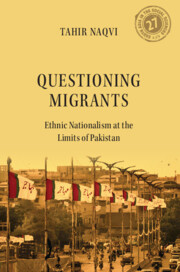3 - After Hijrat: The Urban and Subjective Terrain of Settlement
Published online by Cambridge University Press: 13 November 2024
Summary
O you who are crying for the old world, talk about the new Karachi
Life's new story will begin with the new Karachi,
These are the streets where the new molds of culture will be created
These are the streets where the new civilization will grow and emerge.
—Rais Amrohvi, “Karachi” (Amrohvi 1953: 102)Rais Amrohvi's emancipatory vision of post-Partition Karachi as a “new mold” for the creation of Muslim civilization highlights a tendency found in many settler narratives: the negation of that which existed before their arrival (Rolph-Trouillot 1995). The role of Muslim nationalism in shaping this tendency is illustrated by another poem entitled “Karachawi,” in which Karachi, a city whose name harkens to the pre-colonial history of Sindh, is recast by Amrohvi as a crucible of political unity under Islam:
Someone tell the nation worshippers we are Muslim by Islam's order.
We are not Barelvi, or Deobandi, or Lukhnawi, or Dehlavi,
Our title is the Umma's guardians, our country is the expanse of the world.
If a designation is necessary then you can call us Karachawi. (1953: 200)
What was the role that mass migration and nation building played in (re) shaping the trajectory of postcolonial urbanization in Karachi? A good place to begin is with the exodus of Karachi's native, non-Muslim population following independence. Chapter 2 considered how, like many pre-Partition cities in western Pakistan, Karachi possessed a non-Muslim majority until the outbreak of communal violence (much of it perpetrated by incoming refugees seeking shelter and revenge) prompted an exodus. By 1951, Karachi's non- Muslim population had been “more than replaced by the vast stream of incoming Muslims who … classed themselves as Muhajir” (Census of Pakistan 1951: 131). The effects of this demographic transformation on Karachi's economic, ethnic, and political landscape were sudden and far-reaching. The exodus of the non-Muslim majority created a “new ratio” (see Chapter 2), leaving the city without an existing dominant ethnic or religious group whose language, public norms, and forms of urban territoriality would have to be negotiated by incoming migrants.
- Type
- Chapter
- Information
- Questioning MigrantsEthnic Nationalism at the Limits of Pakistan, pp. 71 - 84Publisher: Cambridge University PressPrint publication year: 2025

